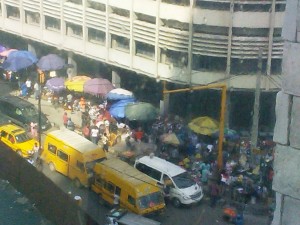Different countries offer different travel and living conditions. This has an effect – identified as the “hassle factor” by professors Andreas Schotter and Paul Beamish from the Ivey Business School in Canada – on companies’ decisions to locate their operations in a particular country. Not all countries are the same in Africa, and the hassle factor varies significantly across them.

The hassle factor combines a number of factors that capture travel and living inconveniences in a country (ordered from higher to lower importance): local transportation; climate; business facilitation; health & medical; risks for women; visa and entry permits; telecommunications; hotel standards; language; food, water, and hygiene; and personal safety.
To give you some reference points, Denmark has the lowest hassle factor (0.805) and ranks 1, and Sudan has the highest hassle factor (4.795) and ranks 131; the US ranks 12 and Spain 33 (scores 1.029 and 1.644 respectively). Most of the Sub-Saharan and Southern African countries included in Schotter and Beamish’s study scored from medium-high to high ‘hassle’:
| COUNTRY | RANK* | SCORE | COUNTRY | RANK* | SCORE | |
| Madagascar | 22 | 1.286 | Senegal | 112 | 3.770 | |
| Mauritius | 44 | 2.019 | Ivory Coast | 115 | 3.870 | |
| South Africa | 64 | 2.563 | Ethiopia | 118 | 3.946 | |
| Swaziland | 86 | 3.026 | Zambia | 121 | 4.019 | |
| Uganda | 87 | 3.124 | D. R. Congo | 123 | 4.114 | |
| Tanzania | 92 | 3.265 | Mali | 124 | 4.122 | |
| Ghana | 93 | 3.269 | Nigeria | 127 | 4.189 | |
| Zimbabwe | 103 | 3.478 | Burkina Faso | 128 | 4.427 | |
| Cameroon | 105 | 3.525 | Angola | 130 | 4.687 | |
| Kenya | 108 | 3.567 | Sudan | 131 | 4.795 | |
| Mozambique | 110 | 3.672 |
* Lower ranks indicate lower hassles
Have you experienced the hassle in any of these countries?
If you want to learn more about the research by Profs. Schotter and Beamish, incidentally, you should look at “the hassle factor” web page, and at their article:
Schotter, A., & Beamish, P. W. (2013). ‘The hassle factor: An explanation for managerial location shunning,’ Journal of International Business Studies, 44(5), 521-544.


I guess it also depends where you come from. Probably many Africans will note that the hassle factor they experience in most European countries is much higher than the one they experience in Africa. It might be easy to work and live in Europe as a European but as an African you can’t even be sure that you get a visa to come here.
That’s very true, Christian!
Schotter and Beamish’ point in their article is that hassles for managers are an important factor determining in location decisions of MNEs, and they used data from Japan. The various dimensions of the “hassle factor” were obtained from a number of secondary data sources.
Africa, I don´t have any experience in these coutries but I felt this hassel when I was negotiating a labor relation in Saudi Arabia with a big corporation. Visa and entry permits were one of the main hassle factors there. But I can imagine how difficult must be choice a country to go like Burkina Fasso, a country that remains 181st out of 187 in the UN Human Development Index and last October 30th outbreaks of deadly violence surged there.
Thank you, Jose Pedro. In fact, I don’t know of any MNE with operation in Burkina Fasso — although there might be… In contrast, I know of some NGOs going there
Many companies that have successfully located presence in African countries face various hurdles that can be taken for granted in developed climes. African governments are putting measures in place, most especially when it comes to business registration and licensing, to ensure a faster process. The “hassle” is real, no doubt, but some of the few attractive countries, the returns in the near and long term may outweigh the initial obstacles. Companies that have operated successfully in Africa despite the hassle adapt to the environment through a combination of the following:
a) Location of their manufacturing facilities in industrial clusters which often have “decent” infrastructure to support businesses and normal daily life
b) For the service oriented companies, offices are typically located in industrial districts, which are mostly very expensive, but offer required infrastructure for business and living
c) Locating manufacturing facilities in countries with seemingly better “hassle factor” that serve as base to distribute to the rest of Africa (example are companies with manufacturing base in either Ghana or South Africa but who’s major market is Nigeria). This way, minimal support services (usually sales and marketing) may be offered at the destination countries for such companies’ products
Hi Obiyemi, thanks for sharing these useful insights.
Just for clarification: Schotter and Beamish’ hassle factor refers to hassles for the individual managers as one of the elements that influence location choice. Of course, there are many other factors that influence these decisions. I guess that the type of factors you mention refer to hassles for the company’s operations — which, of course, are critical!